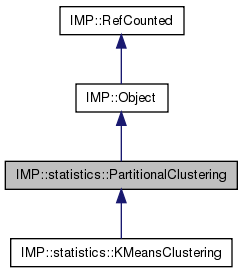Data items are represented by an index. In a partitional clustering each item can only be contained on one cluster. The mapping between data items and the information needed by the clustering algorithm is maintained by a helper object such as Embedding.

Public Member Functions | |
| virtual const Ints & | get_cluster (unsigned int i) const =0 |
| virtual int | get_cluster_representative (unsigned int i) const =0 |
| virtual unsigned int | get_number_of_clusters () const =0 |
| PartitionalClustering (std::string name) | |
Friends | |
| template<class T > | |
| void | IMP::internal::unref (T *) |
| virtual const Ints& IMP::statistics::PartitionalClustering::get_cluster | ( | unsigned int | i | ) | const [pure virtual] |
Return the list of indexes in the ith cluster.
| virtual int IMP::statistics::PartitionalClustering::get_cluster_representative | ( | unsigned int | i | ) | const [pure virtual] |
Return the index of an item that "typifies" the ith cluster.